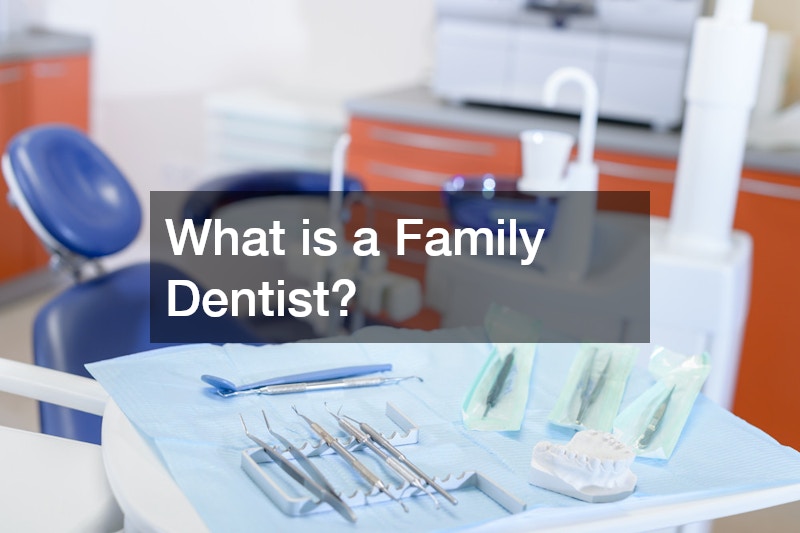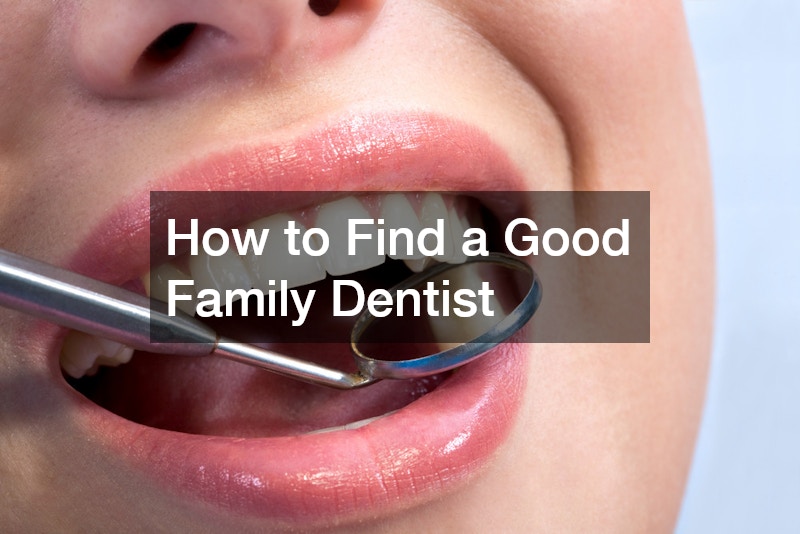Finding the right family dentist is essential for maintaining the oral health of every member of your family, from children to adults. A family dentist provides the convenience of comprehensive care for all ages under one roof, which can make managing appointments and dental treatments more streamlined. But with so many options, how do you know what to look for when selecting a family dentist? This article will guide you through the most important factors to consider when choosing a family dentist. We’ll answer the ten most frequently asked questions to help ensure that your family receives the best care possible.
1. What is a Family Dentist?

A family dentist is a dental professional who specializes in treating patients of all ages, providing care that is suited to both children and adults. A family dentist differs from pediatric dentists, who focus solely on children, and general dentists, who may not have experience with the varying needs of a family.
1.1 Definition of a Family Dentist
A family dentist’s office caters to the unique oral health needs of families, often providing a wide range of services. These services can include preventive care, emergency treatment, and cosmetic dentistry for children, adults, and seniors alike. The goal is to offer a comfortable and accessible environment for all family members.
1.2 Qualifications and Training
To be a family dentist, professionals must complete the necessary educational qualifications, including a degree in dentistry, followed by specialized training to address the dental needs of different age groups. Family dentists also need to stay up-to-date with continuing education to ensure they can offer the latest in dental technology and treatment methods. This training often includes child-friendly techniques, geriatric care, and expertise in general oral health.
1.3 Services Offered
Family dentistry is more comprehensive than just routine checkups. Family dentists offer a variety of services, including preventive care like dental cleanings, restorative treatments such as fillings or crowns, and even complex procedures like wisdom teeth removal. Cosmetic services like teeth whitening or affordable braces for children and teenagers are also common offerings. A family dentist office is a one-stop shop for all your family’s dental needs.
2. The Importance of a Family Dentist
Choosing a family dentist offers several advantages, including consistent care, convenience, and comprehensive treatment.
2.1 Continuity of Care
Continuity of care is one of the most significant benefits of family dentistry. When your family sees the same dentist over time, it allows for better tracking of your dental history and any changes in your oral health. A dentist familiar with your medical background can catch potential issues earlier and provide more accurate treatment plans.
2.2 Convenience for Families
Having a family dentist can save you time and effort. Rather than scheduling appointments at multiple dentist offices for each family member, you can book back-to-back appointments at one location. This convenience is especially important for families with young children or elderly relatives who may have specific dental needs.
2.3 Comprehensive Care
Family dentists provide comprehensive care for all stages of life. Whether it’s your child’s first dental visit, your teenager’s need for affordable braces, or a senior family member requiring dentures, a family dentist is equipped to handle it all. They can monitor oral health over time, ensuring that preventive measures are taken to avoid more significant issues down the road.
3. How to Find a Good Family Dentist

Selecting the right family dentist involves research and a thorough assessment of various factors.
3.1 Recommendations and Reviews
One of the best ways to find a good family dentist is by asking for recommendations from friends, family, and colleagues. Reading online reviews of dentist offices in your area can also give you an idea of the quality of care they provide. Look for patterns in the feedback, especially concerning the dentist’s bedside manner, office environment, and how they handle children and anxious patients.
3.2 Professional Credentials
Before choosing a dentist, make sure to verify their professional credentials. Ensure that the dentist has the proper licenses and certifications to practice family dentistry in your state. Additionally, check if they are affiliated with respected dental organizations such as the American Dental Association (ADA) or other professional groups.
3.3 Initial Consultation
Schedule an initial consultation with potential family dentists. This first visit allows you to meet the dentist, assess the office environment, and ask any questions about their practice. Make sure the family dental office feels welcoming, clean, and child-friendly. This consultation is your opportunity to evaluate whether the dentist is a good fit for your family’s needs.
4. What Services Should a Family Dentist Provide?
When choosing a family dentist, it’s crucial to ensure they offer a wide range of services to meet the varied needs of your family.
4.1 Preventive Care
Preventive care is the foundation of good oral health. Family dentists should offer routine services like dental cleanings, fluoride treatments, and sealants to prevent cavities. In addition, your dentist should be equipped to perform more complex procedures such as wisdom teeth removal, particularly for older teenagers and young adults.
4.2 Restorative Treatments
Restorative treatments are another key service provided by family dentists. These treatments include fillings, crowns, bridges, and dentures to restore the function and appearance of damaged or missing teeth. Your dentist should also provide emergency care for dental injuries or infections.
4.3 Cosmetic Procedures
Many family dentists offer cosmetic procedures like teeth whitening, veneers, and even affordable braces for children and teenagers. These services are designed to improve the appearance of your teeth and boost your confidence. When choosing a dentist, ask whether they provide these services, as they may be essential as your children grow and their dental needs change.
5. What to Expect During Your First Visit

Your first visit to a family dentist is an important step in establishing a relationship with them. Knowing what to expect can help ease any anxiety.
5.1 Medical and Dental History
During your initial visit, dentists will typically start by reviewing your medical and dental history. This information is vital for understanding any underlying health conditions that could affect your oral health. Be prepared to discuss past dental procedures, any current medications, and any concerns you have about your teeth or gums.
5.2 Comprehensive Exam
Following the review of your history, the dentist will perform a comprehensive oral exam. This will include checking your teeth, gums, and mouth for signs of decay, infection, or other issues. The dentist may also take X-rays to get a detailed view of your teeth and jaw structure.
5.3 Personalized Treatment Plan
After the exam, the dentist will discuss a personalized treatment plan that addresses your immediate dental needs and long-term oral health goals. Whether you need preventive treatments like dental cleanings or more complex procedures like wisdom teeth removal, your family dentist will outline the next steps for maintaining or improving your oral health.
6. How Often Should You See Your Family Dentist?
Regular dental visits are essential for maintaining oral health, but the frequency of those visits can depend on your family’s specific needs.
6.1 Routine Checkups
Most general dentistry practices recommend that patients visit their family dentist every six months for routine checkups and dental cleanings. These visits are important for preventing issues like cavities, gum disease, and plaque buildup. Regular cleanings help keep your teeth in good condition and allow the dentist to catch any potential problems early.
6.2 Emergency Visits
In addition to routine visits, your family dentist should be available for emergency appointments. Whether it’s a broken tooth, severe toothache, or sudden injury, your family dentist should offer prompt care to relieve pain and prevent further complications.
6.3 Special Dental Needs
Some family members may have special dental needs that require more frequent visits. For example, individuals with braces may need to see the dentist every few weeks for adjustments, while those with gum disease might require more regular cleanings to manage their condition.
7. How to Handle Dental Anxiety in Children and Adults

Many people, both children and adults, experience dental anxiety. A good family dentist will take steps to alleviate that fear and make visits as comfortable as possible.
7.1 Creating a Comfortable Environment
A welcoming and soothing atmosphere is crucial for easing dental anxiety. Many general dentistry offices are designed with comfort in mind, offering amenities like calming music, children’s play areas, and even TV screens in treatment rooms. A family dentist should also be skilled at creating an environment that puts both children and adults at ease.
7.2 Communication and Patient Education
Open communication is key to reducing anxiety. A family dentist should take the time to explain each step of the procedure and answer any questions the patient may have. Patient education is especially important for children, who may be nervous about visiting the dentist. Explaining procedures in simple, non-threatening language can help alleviate their fears.
7.3 Sedation Options
For patients with severe dental anxiety or for those undergoing more complex procedures, sedation options may be available. These options can range from mild sedation to help a patient relax to more advanced methods like intravenous sedation for wisdom teeth removal or extensive restorative work. Ask your family dentist if sedation is available if you or your child experiences significant anxiety during dental visits.
8. Questions to Ask Your Family Dentist
Before committing to a family dentist, make sure you ask the right questions to ensure they are the best fit for your family’s needs.
8.1 Qualifications and Experience
One of the first questions to ask your family dentist is about their qualifications and experience. Find out where they received their training and how long they have been practicing family dentistry. Experienced dentists are more likely to have dealt with a wide variety of cases, from routine checkups to complex procedures like wisdom teeth removal. It’s also important to ask if they regularly attend continuing education courses to stay updated on the latest dental techniques and technologies.
8.2 Range of Services
Ask your dentist about the range of services they offer. A comprehensive family dental office should provide preventive care, restorative treatments, and cosmetic procedures, including options for affordable braces. Whether you need routine dental cleanings or more specialized treatments, having a dentist who offers a broad range of services means you won’t have to visit multiple specialists for different family members. If your children might need braces in the future, ask if the dentist offers orthodontic treatments or can refer you to a specialist.
8.3 Payment and Insurance Policies
It’s crucial to understand the payment and insurance policies of the family dentist you choose. Ask whether they accept your medical insurance and if they offer any flexible payment plans for treatments that may not be fully covered, such as affordable braces. Inquire about whether they have options for patients without insurance, such as in-house payment plans or discounts for cash payments. Understanding these financial details upfront can help you avoid surprises later.
9. Benefits of Having a Family Dentist
Having a family dentist can offer several long-term benefits, from personalized care to a preventive approach that keeps your family’s oral health on track.
9.1 Personalized Care
One of the major benefits of having a family dentist is the personalized care that comes from a longstanding relationship. At a family dental office, the dentist gets to know each member of your family over time, which allows them to tailor their approach to individual needs. They can monitor your family’s oral health history and make informed decisions on treatments based on past care.
9.2 Long-term Relationship
Building a long-term relationship with a family dentist means you have someone you can trust with your family’s oral health needs. This ongoing relationship can lead to more consistent care, as the dentist is familiar with your medical history, any allergies or sensitivities, and your overall dental goals. This trust can also make visits to the dentist less stressful, especially for children, as they become accustomed to seeing the same dental professional year after year.
9.3 Preventive Focus
A family dentist typically emphasizes a preventive approach, focusing on regular dental cleanings and checkups to catch problems early. Preventive care is key to avoiding more serious dental issues like cavities, gum disease, or tooth loss. By consistently seeing the same dentist, you are more likely to stick to a preventive schedule, which can lead to better long-term oral health for your entire family.
10. Signs You Need to Switch Family Dentists
While it’s important to build a relationship with your family dentist, there may come a time when you need to consider switching providers. Here are some signs that it might be time to look for a new family dentist office.
10.1 Poor Communication
Good communication is essential in any patient-dentist relationship. If you feel like your current dentist isn’t listening to your concerns, isn’t clear in their explanations, or doesn’t provide adequate updates on your treatment, it might be time to look for local dentists who prioritize patient communication. A lack of transparency about procedures, costs, or treatment plans can be a significant red flag.
10.2 Lack of Modern Facilities
Dental technology is constantly evolving, and a good family dentist should be using modern equipment and techniques to provide the best possible care. If your dentist’s office lacks updated tools or uses outdated methods, it could mean they aren’t offering the highest standard of care. Consider switching to a family dentist who invests in the latest dental technologies for diagnostics and treatment.
10.3 Unavailable or Unreliable Service
Consistency and availability are key components of good dental care. If your current dentist is frequently unavailable, doesn’t offer emergency appointments, or is unreliable in scheduling routine checkups, it might be time to make a change. Family dentistry should prioritize the needs of the entire family, and a good dentist will make themselves available when you need them most. If this isn’t happening, it may be worth exploring other options.
Conclusion
Finding the right family dentist is an essential step in ensuring the oral health and well-being of your entire family. By considering factors like qualifications, range of services, and patient reviews, you can make an informed decision when choosing a family dentist office. A good family dentist can provide comprehensive care for all ages.
A long-term relationship with a family dentist offers personalized care, continuity, and a preventive focus that will benefit every family member. On the other hand, recognizing signs that it’s time to switch providers—such as poor communication, outdated facilities, or unreliable service—can help ensure you’re getting the quality care you deserve. Ultimately, the right family dentist will not only provide excellent oral health care but also create a comfortable and welcoming environment that makes dental visits something your entire family can look forward to.
